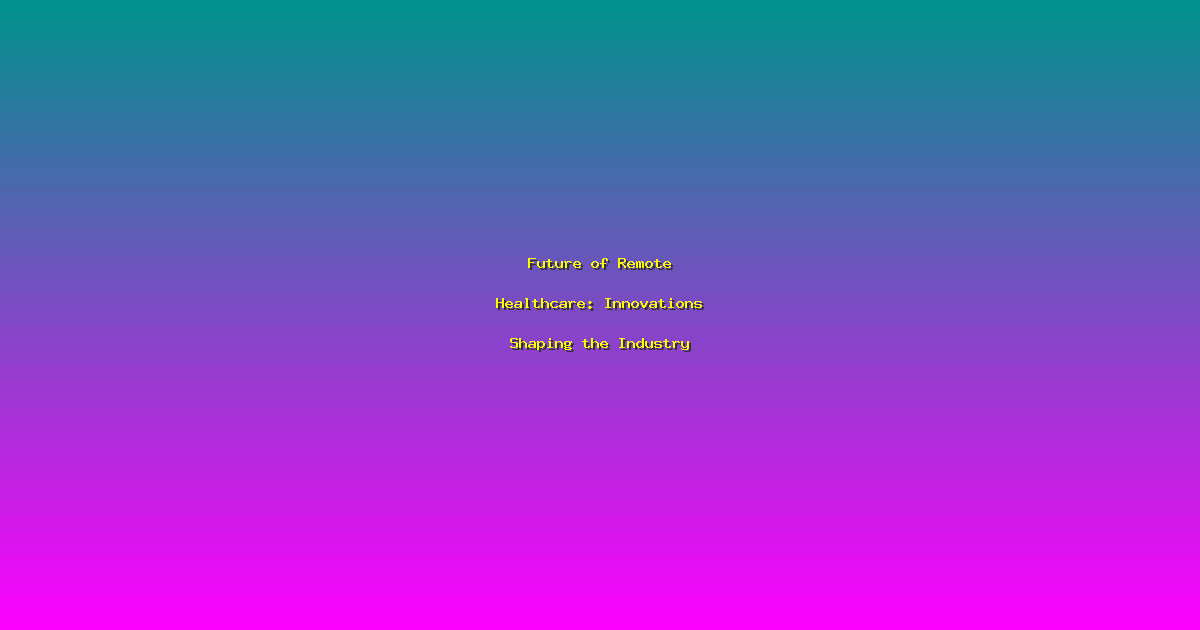Future of Remote Healthcare: Innovations Shaping the Industry
Remote healthcare, or telemedicine, has transformed the way medical services are delivered, making healthcare more accessible and convenient for patients around the world. As technology continues to evolve, the future of remote healthcare looks even more promising with the introduction of new innovations that are set to revolutionize the industry. This article explores the advancements that are shaping the future of remote healthcare.
Artificial Intelligence (AI) in Diagnostics
One of the most significant advancements in remote healthcare is the integration of artificial intelligence (AI) in diagnostics. AI algorithms can analyze patient data to predict and diagnose diseases at early stages, allowing for timely and precise interventions. This technology not only improves the accuracy of diagnoses but also reduces the workload on healthcare professionals.
Wearable Technology for Continuous Monitoring
Wearable technology is another innovation that is set to change the face of remote healthcare. Devices such as smartwatches and fitness trackers can monitor vital signs, physical activity, and even sleep patterns. This continuous monitoring provides healthcare providers with real-time data, enabling them to intervene promptly when health issues arise.
Virtual Reality in Therapy
Virtual reality (VR) is being explored as a tool for therapy, particularly in mental health treatment. VR allows patients to experience simulated environments that can help them confront and overcome their fears and anxieties in a controlled setting. This technology can offer a more engaging and personalized therapy experience compared to traditional methods.
5G Technology and Remote Healthcare
The rollout of 5G technology is set to play a crucial role in the future of remote healthcare. With faster data transmission speeds and lower latency, 5G will enable seamless communication between healthcare providers and patients, facilitating real-time remote consultations and remote surgery with greater precision and reliability.
Telehealth Accessibility and Equity
While remote healthcare has the potential to increase access to healthcare services, especially in underserved areas, there remains a challenge in ensuring equity in access. Innovations are required to bridge the digital divide, ensuring that all individuals have the necessary technology and support to benefit from remote healthcare services.
FAQs
What is the future of remote healthcare?
The future of remote healthcare involves the integration of advanced technologies like AI, VR, and 5G to provide more personalized, efficient, and accessible healthcare services.
How does AI enhance remote healthcare?
AI enhances remote healthcare by providing predictive analytics, diagnosing conditions through pattern recognition, and automating administrative tasks, which allows healthcare providers to focus more on patient care.
What role does 5G play in the future of remote healthcare?
5G technology supports faster data transfer and reduced latency, which is crucial for real-time remote consultations and surgeries, ensuring more reliable and efficient remote healthcare services.
How can wearable technology impact remote healthcare?
Wearable technology can continuously monitor patients' health and send real-time data to healthcare providers, enabling timely intervention and personalized treatment plans.
Is telehealth accessible to everyone?
While telehealth has the potential to increase access to healthcare, addressing the digital divide and ensuring equitable access remains a challenge that needs ongoing innovation and policy support.

